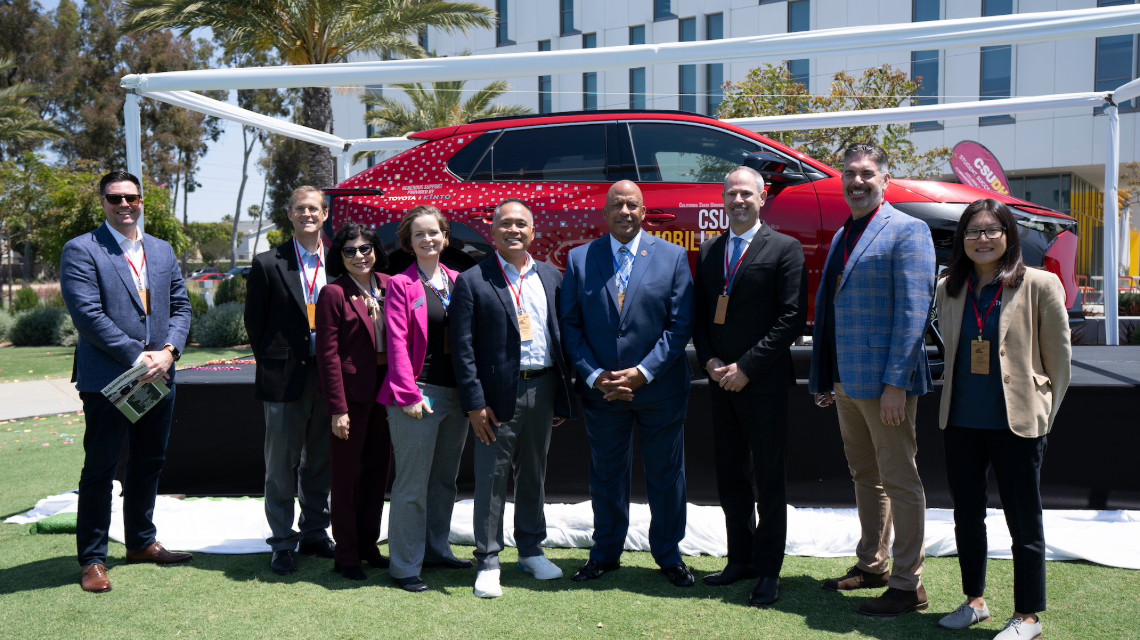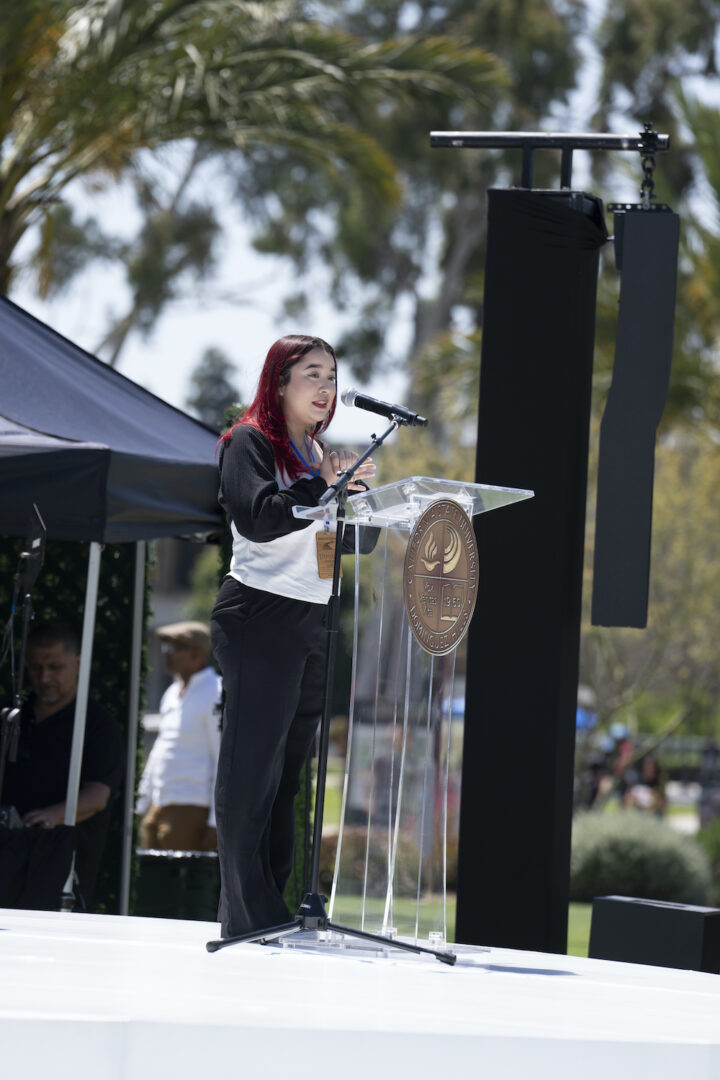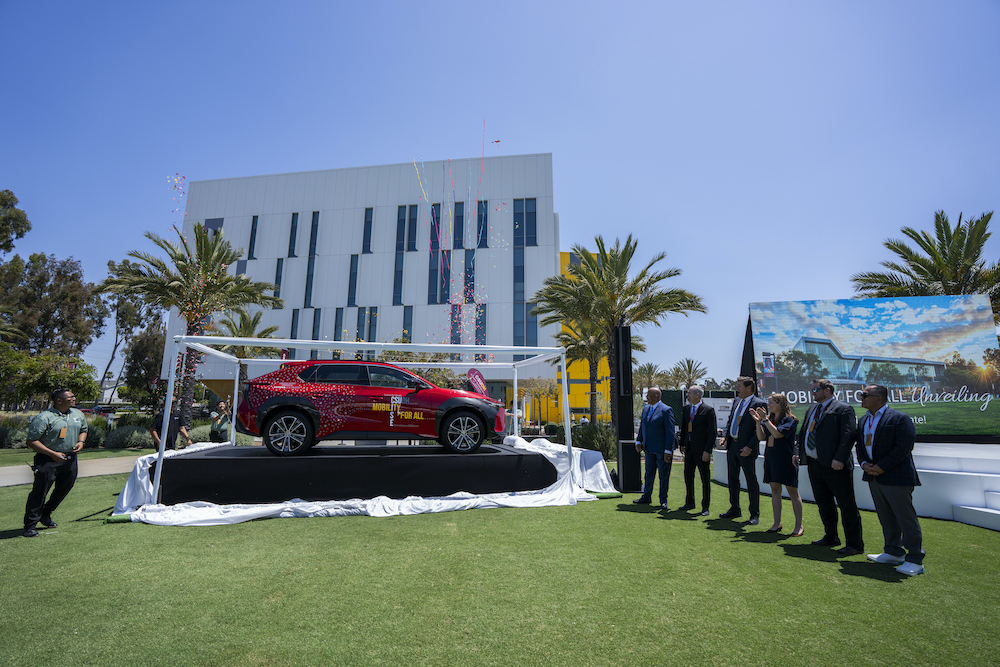New Initiative with Toyota Aims to Improve Mobility for Underserved Communities

On April 30, CSUDH and Toyota Motor North America (TMNA) launched a multipronged program focused on transportation equity for the university and its surrounding communities based on the idea of “Mobility for All.”
The initial phase of the program will establish the Center for Resilient, Equitable, and Sustainable Transportation (CREST) at CSUDH, made possible by a $1.2 million grant from Toyota. Housed within CSUDH’s Center for Innovation in STEM Education, CREST will engage faculty and students in research, curricula, and paid internships to find solutions to the myriad mobility challenges faced by members of the university and wider community.
“Toyota believes that when people are free to move, anything is possible,” said Tom Stricker, group vice president of Toyota Sustainability & Regulatory Affairs. “CREST aligns perfectly with Toyota’s ‘Mobility for All’ vision, which aims to leave ‘no one behind’ by providing people with accessible, low, and zero emission mobility solutions to meet their diverse needs.”

CSUDH students, many of whom are low-income, minority, or first-generation, face numerous barriers to education—one of which is inadequate transportation. More than 95 percent of CSUDH students commute to campus, and a needs assessment conducted in communities around the university revealed transportation disparities and limited public transit options. CREST will serve as an information hub, offering resources for accessible and affordable transportation options for CSUDH students, faculty, and staff, and will expand its reach to the City of Carson and other target geographic areas over the course of five years.
“CREST will offer students and local residents mobility options that are flexible, affordable, reliable, and accessible,” said Kamal Hamdan, executive director for the CSUDH Center for Innovation in STEM Education and one of the primary architects of “Mobility for All.”
“This is a transformational project focused on improving quality of life and creating lasting change in the communities we serve.”
Providing students with sustainable and accessible transportation is another key element of the program. KINTO, Toyota’s carsharing program, will supply CSUDH with 20 hybrid and/or battery electric vehicles starting in Fall 2024 to increase students’ access to convenient vehicle renting at a discounted rate.

To accommodate the new vehicle fleet and offer improved charging capabilities on campus, CSUDH is also partnering with Southern California Edison to install Level 2 electric charging stations on campus in the near future.
“KINTO mobility solution is designed to increase mobility through the EV-based ridesharing program,” said Kevin McKeever, general manager, KINTO & Fleet Management. “With 34 locations already across California, we’re excited to open the newest KINTO location on the CSUDH campus for students, faculty, and staff.”
Additionally, CSUDH is in the early stages of reconfiguring the space along Victoria Parkway into a Metro Transit Hub. This joint project with the City of Carson would be funded by $3.5 million allocated to the campus by LA Metro. The ultimate vision of “Mobility for All” is to create a campus Mobility Hub to help minimize commuters’ carbon footprint with upgraded public transit and transportation inter-modalities.
“Just as the university upgraded its infrastructure to support the 1984 Olympics and host events, CSUDH aims to ready the campus to better serve attendees of the 2028 Summer Olympics, for which we are hosting several events,” said Vice President for University Advancement Eva Sevcikova.
“Whether it’s higher education, the government, or the private industry, every partner at the table is driven by a collective focus on the socio-economic mobility of our students—helping them attain a college degree and join the region’s workforce,” she said.
“These initiatives promise to create ripples throughout the South Bay, benefitting communities and better connecting us all.”
Latest News
- Super Regional Loss Ends Another Strong Toro Softball SeasonThe Toro softball team suffered a tough 7-6 extra-inning loss to the Western Washington University Vikings in Game Three of the NCAA West Super Regional on Wednesday, May 15. The result eliminated CSUDH from the tournament and put an end to another stellar season. The Toros reached the Super Regional after sweeping through the NCAA […]
- Benefactors Give Big to College of Ed in Annual Scholarships for Aspiring EducatorsThe distribution of scholarships each year by the College of Education (COE) demonstrates the generosity of CSUDH’s many benefactors, but it also reinforces the university’s commitment to education and to the training of our next generation of educators. “We’re awarding more than 40 scholarships today, totaling more than $100,000,” said Jessica Pandya, dean of the […]
- President Parham Receives Distinguished Service Medal, Addresses Graduates from Teachers College, Columbia UniversityAt the Teachers College, Columbia University Convocation ceremony in New York on May 14, CSUDH President Thomas A. Parham received a Medal for Distinguished Service—the highest honor bestowed by the college. As an award recipient, he also addressed graduates, families, and guests during the ceremony for the departments of Counseling & Clinical Psychology, and Human Development. […]
- Kennedy Center Honors Toro Student PlaywrightWhenever CSUDH student and aspiring playwright Wayne Sam needs inspiration or motivation, he glances over at an old typewriter that was given to him by his late grandfather. “He was a writer as well,” says Sam. “He really wanted me to write and pushed me forward. He promised me his old typewriter when he passed. […]
- Toro Softball Reaches West Super RegionalToros Top Northwest Nazarene 3-1 To Advance To NCAA West Super Regional
- L.A. Sentinel: Teachers College of Columbia University Honors Dr. Thomas ParhamSource: L.A. Sentinel Dr. Thomas Parham, president of California State University, Dominguez Hills, will receive the Medal of Distinguished Service from the Teachers College at Columbia University on Tuesday, May 14. The honor recognizes Parham for being a pioneer of multicultural psychology and dedicated to the betterment of society throughout his 35+ years career as […]


